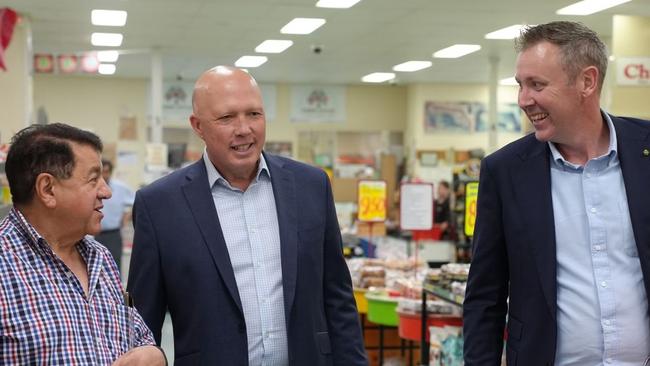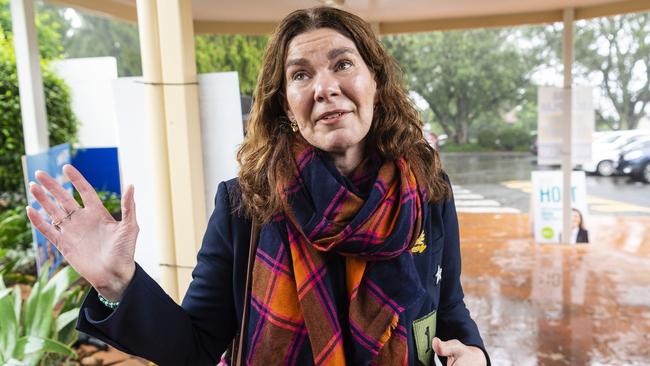Groom MP Garth Hamilton helps create Coalition policy on Woolworths, Coles supermarket divestiture proposal
Australia’s two biggest supermarket chains could be broken up if they continued with anti-competitive behaviour under a new Coalition proposal that Toowoomba’s MP has not only supported but helped create.
Toowoomba
Don't miss out on the headlines from Toowoomba. Followed categories will be added to My News.
Toowoomba’s federal MP Garth Hamilton says he wants to see more Betros Bros stores and less Coles or Woolworths in the city — and wants the government to be able to break the big players up if it’s the best course of action.
The member for Groom has revealed he was a major player in the Coalition’s new plan to introduce divestiture laws for the supermarket sector, which was revealed by Opposition Leader Peter Dutton this week.

Under the new laws, the Australian Competition and Consumer Commission could force Coles and Woolworths to sell off locations and even land allocated for future sites in developing areas.
But the significant shift in policy has been controversial within the Liberal Party and split current and former ACCC chairs about its effectiveness.
Locally, leading economists have expressed caution about the use of such government intervention, while Mr Hamilton’s main political rival has called on him to “provide evidence” of its success.
The Toowoomba MP, who has been vocal about introducing divestiture laws for years within the Liberal Party, said recent investigations into anti-competitive behaviour by the “big two” necessitated expanding the ACCC’s punitive measures.
“This policy we’ve got through I’ve been cooking for a while and I’m stoked it’s become part of our policy platform, it’s a significant departure from us in competition policy,” Mr Hamilton said.
“I am strongly of the view that we’re seeing significant market concentration, particularly in supermarkets. There are benefits to big businesses, but you still need to have the ability of the government to show the interests of the nations are being put forward.
“There are examples of bad behaviour (by Coles and Woolworths), forcing farmers and producers into accepting bad deals (and) we’ve seen the supermarkets engage in price-gouging.
“It’s fair to say consumers have had enough.”

Mr Hamilton said divestiture would only be considered as a “last resort” and need to meet certain tests, such ensuring it led to less competition counterintuitively.
“The reality is, this policy would require exceptional circumstances — this is a tool missing from our tool bag,” he said.
“We don’t want to get to that point (of divestiture), but if we do there are some very clear guidelines and it would only take place if it passed tests, and one is a public good test.”
Mr Hamilton’s view has been shared at least in principle by current ACCC boss Gina Cass-Gottlieb and former chairman Allan Fels, but was slammed by ex-chair Graeme Samuel as “populist politics”.
The Greens support the introduction of divestiture laws, while the government believes harsher financial penalties are more suited on the back of April’s supermarket review led by former Labor MP Craig Emerson.
UniSQ academic warns of “risk” with divestiture

One of the region’s leading voices on economics says breaking up duopolies can help drive competition, but the Coalition’s new divestiture plan comes with its own set of risks.
Professor Fabrizio Carmignani, who is dean of the Business School at the University of Southern Queensland, has raised issues with the Opposition’s plan for implementing more punitive measures to stop Coles and Woolworths engaging in anti-competitive behaviour.
Professor Carmignani said divestiture needed to be treated as a “last resort”.
“There has been strong opposition, the Emerson review did not recommend divestiture,” he said.
“The fundamental idea here is to help the market become more competitive, or at least preventing a situation where it would generate a negative outcome.
“We have to see this in the context of a broader toolkit, I don’t think we’d got to divestiture very often.
“Divestiture is a last resort and it should be seen as such — it should be part of the broader toolkit, and there are other things we could do before that.”
Professor Carmignani said divestiture measures could come with unintended consequences due to Australia’s small population and unique markets.
“The main concern with it is if you’re forcing your supermarket to sell one or more of their arms of operation or shops, then there is a risk you end up increasing that concentration,” he said.
“The next point is to implement this, you need to find a willing buyer.
“Then there is also an issue that it would have to pass a public interest test, that there is no net job loss.
“This has been part of the conversation, so if we were to go ahead, there would have to be checks and balances to make sure it doesn’t go against the consumer and workers.”
Groom rival questions need for divestiture

One of Garth Hamilton’s main rivals for his seat at the next federal election says she wants to see the evidence that divestiture laws would deliver a better deal for Darling Downs farmers.
Independent Suzie Holt, who finished second to Mr Hamilton at the 2022 election, said she was prepared to support Coalition’s plan but only under certain conditions.
“Show us the evidence that policies will make food cheaper and protect the viability of the suppliers and I will support and champion that policy,” she said.
“We need a local member who will act for our region and protect farmers and call all sides to the table so that people can afford to eat.”
In response to questions by News Corp about precedence, Mr Hamilton said both the United State and Britain had seen success by breaking up duopolies or monopolies.
“These powers are held in the US and it forms part of its competition policy,” he said.
More Coverage
Originally published as Groom MP Garth Hamilton helps create Coalition policy on Woolworths, Coles supermarket divestiture proposal





